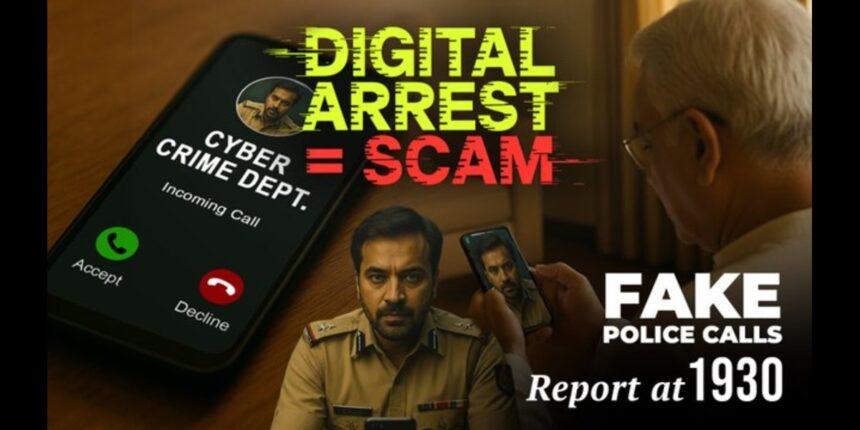Elderly Banker Loses 22.92 Crores in Digital Arrest Scam: A Wake-Up Call for Digital Safety
Imagine getting a call from someone who sounds like a cop. They say you’re in big trouble for money crimes. You stay glued to your phone for days, handing over your savings. That’s what happened to a retired banker in Delhi. He lost 22.92 crores in just a few days to a slick digital arrest scam.
This story shakes us because it shows how crooks prey on trust. In India, online payments are everywhere now. Scammers twist that to fake arrests over video calls. They make you think cops are watching your every move. As these tricks get smarter, we all need to know the signs.
This piece digs into the scam that hit this banker. We’ll see how it works and why old folks like him get caught. Plus, you’ll get real tips to shield your cash and peace of mind. Stay alert—your next call could be the one that tests you.
Understanding the Digital Arrest Scam
Digital arrest scams trick people by faking police action online. Crooks keep victims locked in place through calls or screens. They demand money to “fix” fake crimes. This Delhi case spotlights the danger. The retired banker thought he faced real jail time.
These frauds started small but grew with tech. Now, they hit hard in places like India where phones rule daily life. Why do they work so well? Fear clouds judgment. The elderly often trust officials without question. That trust turns into a trap.
In the Business Today report, the banker shared his nightmare. He was at home when it began. Scammers built a web of lies that lasted days. No one should face that alone.
What Is a Digital Arrest Scam?
A digital arrest scam means fraudsters act like law enforcement to trap you virtually. They use video chats to “hold” you in place. You can’t leave or call help. They claim you’re guilty of crimes like laundering cash. Pay up, they say, or face arrest.
In this case, the banker got calls from fake CBI agents. They said his bank accounts linked to terror funds. He believed it because they sounded real. Real cops don’t do arrests like that over phones. This scam preys on panic.
Elderly victims fall easy. They remember a time when authority meant truth. Tech feels new and scary to them. Scammers mix fear with fake proof to seal the deal.
How the Scam Unfolded in the Delhi Case
It started with a simple call one afternoon. The scammer said he was from the CBI. They claimed the banker’s name popped up in a big probe. Fear hit fast—he stayed on the line.
Over hours, they switched to video. The banker sat at home, “detained” in his own space. They demanded details about his accounts. Then came the transfers. He sent money bit by bit to “safe” spots.
The total? A shocking 22.92 crores. It happened across several days of pressure. They kept him talking, no breaks. When it ended, the crooks vanished. The banker sat stunned, his life’s work gone.
Why Elderly Individuals Are Prime Targets
Old folks like this banker have seen real authority in action. They trust badges and titles without doubt. Scammers know that and play on it. Add in less comfort with apps and screens. It makes spotting fakes tough.
Isolation adds fuel. Many seniors live alone or check in less with family. The Delhi banker was retired, so days blurred. Emotional pulls worked wonders—they threatened his good name.
Think of it like a wolf in sheep’s clothing. The scam hides behind familiar voices. For the elderly, that disguise fools quick. We must watch out for them more.
The Mechanics of the Scam: Step-by-Step Breakdown
Scams like this follow a clear path. They start slow to hook you. Then ramp up the scare. Tech helps them seem legit. In the banker’s story, each step built the cage. Knowing this lets you break free early.
Psych tricks are key. They use urgency and shame. You act fast without thinking. Tools like fake IDs on calls make it real. Spot the pattern, and you win.
This breakdown uses the Delhi case. It shows how 22.92 crores slipped away. Don’t let it happen to you.
Initial Contact and Building Credibility
First comes the ring. It looks like an official number. The voice claims police or agency ties. They drop names and details to sound true. In Delhi, the call hit the banker’s phone out of nowhere.
They say you’ve got dirty money in play. Proof? Fake docs shared on screen. You freeze, heart racing. Why question now? They build walls of doubt around you.
Credibility grows with small asks. Share this ID, they say. It feels routine. But it’s the hook sinking in.
The Isolation and Intimidation Phase
Next, they pull you in deep. Switch to video—now they “see” you. Stay put, they warn. No calls to family or friends. Tell anyone, and you’re in more trouble. The banker endured this for days.
Intimidation ramps up. Threats of raids or jail fill the air. You feel trapped, even at home. It’s like a bad dream you can’t wake from. Hours pass in fear.
They watch your moves on cam. No escape. This phase breaks your will. Compliance follows.
Extraction of Funds and Covering Tracks
Now the cash grab. They say transfer money to “secure” it. Use UPI or apps you know. It’s for verification, they claim. The banker sent chunks over time. Total hit 22.92 crores.
Multiple accounts pop up—fake ones. They guide each step live. Once done, they cut ties. No trace left.
Covering tracks? They warn against talking. If you do, blame falls on you. Smart crooks vanish quick.
Real-World Impact and Broader Implications
Losing that much money ruins lives. The banker faced empty accounts and shattered trust. But it ripples out. Families suffer too. Society pays in lost faith and cop time.
In India, these scams spike with more online banking. The Delhi Police jumped in after the report. They hunt the gang now. Yet, victims like him wait for scraps back.
This case warns us all. One slip, and everything crumbles.
Personal Devastation for the Victim
The banker lost his nest egg. Years of work gone in blinks. Confusion hit hard—he replayed calls in his head. Regret mixed with fear of more trouble.
Mental hits linger. Anxiety creeps in. Sleep flees. The Business Today video showed his tired eyes. Recovery? A long road of paperwork and doubt.
Friends stepped up, but the scar stays. Money’s one thing. Peace of mind? That’s harder to fix.
Societal and Economic Ramifications
Trust in banks wobbles after tales like this. People pause before app taps. That slows India’s digital push. Cops stretch thin chasing ghosts online.
The Delhi case strains resources. Probes take time and tech. Broader? Crooks steal from the pot we all share. Elderly scams hit communities hard.
We lose when fear rules. But awareness can flip that.
Lessons from Similar Incidents in India
Delhi isn’t alone. Mumbai saw a doc lose lakhs to fake arrests last year. Reports pile up in cities big and small. Each echoes the same play—calls, videos, cash grabs.
Media covers these often. One pattern? Victims wait too long to speak. Early yells could save others.
These stories teach us. Scams spread fast. Learn from them, don’t repeat.
Prevention Strategies: Actionable Tips to Stay Safe
You can fight back. Start with basics like checking calls. Build habits that spot lies. For the elderly, simple steps save fortunes. The banker’s loss shows why.
Share these with family. Make safety a group thing. No one’s immune. Act now.
Tips here draw from real advice. They fit anyone.
Verify Caller Identity Before Acting
Hang up if it smells off. Call back using numbers you find yourself. Like the local station’s line. Real cops don’t chase cash over phones.
In the Delhi scam, blind trust cost crores. Ask for badges or IDs in person. Never online.
Doubt saves you. Always.
Secure Your Digital and Financial Accounts
Turn on two-step checks for apps. Watch statements weekly. Spot weird pulls fast. Never share one-time codes. That’s your key.
Use tools like bank alerts. The cyber portal app warns of tricks. Freeze cards if doubt hits.
Strong locks keep thieves out. Simple as that.
Educate and Build a Support Network
Talk scams at family dinners. Show videos like the Business Today one. Seniors learn quick in groups.
Join workshops from banks or cops. RBI tips online help too. Build a net—call a kid if a call feels wrong.
Knowledge spreads. One chat stops a scam.
What to Do If You Suspect a Scam
Stop all talk right away. Dial 1930 for India’s cyber help. Tell them everything.
Freeze accounts through your bank app. Save screens of the fraud. The Delhi banker reported late, but it sparked a hunt. Act fast—cops move quicker.
Report, recover what you can. You’re not alone.
Conclusion
The elderly banker’s tale of losing 22.92 crores to a digital arrest scam hits home. It started with a call and ended in ruin. But breakdowns show the path: fake contacts, isolation, and cash grabs. We see why seniors fall prey and how society feels the shake.
Key points stick. Verify every suspicious call. Lock down your accounts tight. Build family shields against tricks. If caught, report at once to 1930. These steps turn victims into victors.
Vigilance wins. Share this story. Protect your circle. In a wired world, your smarts keep the crooks at bay. Stay safe out there.

